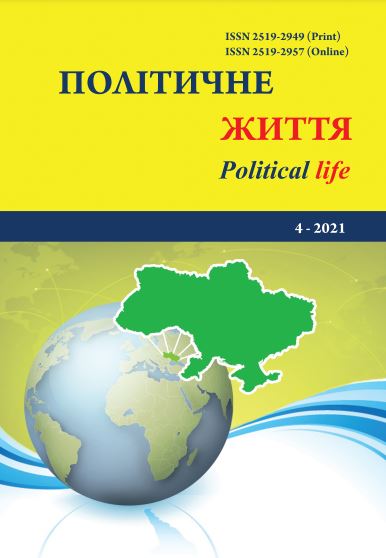Soft power of the Republic of Turkey: cultural and educational aspects
DOI:
https://doi.org/10.31558/2519-2949.2021.4.13Keywords:
soft power; public diplomacy; Republic of Turkey; cultural diplomacy; educational diplomacy; foreign policyAbstract
Globalization and the changing balance of power in the world have led to changes in international politics and the emergence of new forms of diplomatic activity. In their foreign policy, states increasingly attach importance to the public opinion of citizens of other countries, as well as forms of communication and interaction that these societies establish with each other. The new understanding of diplomacy now attaches more importance to soft power, culture and civil society, building a national brand. Policies and ways of using soft power are implemented primarily through cultural diplomacy, which is based on finding commonalities between different cultures. This article discusses the concept of soft power which is an important issue in modern theory of international relations. The concept of soft power which expresses another dimension of power is a type of power that is more difficult to define, express, measure, and evaluate. Today, it can be argued that the use of soft power is the most common method used by international actors which is changing with the international structure and the development of conditions in this direction. In this context the article examines the soft power of the Republic of Turkey, its role in foreign policy, and ways of implementing it. The authors focus separately on the cultural and educational aspects of Turkey’s formation of its identity in the world, the directions of its public diplomacy, and the role of individual institutions and state bodies in this process. After the end of the Cold War, Turkey underwent several stages of political transformation and changes in the ideological concepts of its foreign policy. Guided by the ideas of Pan-Turkism and the need for economic development, in the last decade of the 2000s TR increased its presence in the region, especially in Turkic-speaking countries. Cultural expansion becomes a model of the use of soft power, creates the national image of the country, but does not give the desired results. It is argued that the concept of soft power has played a greater role in Turkey’s foreign policy since The Justice and Development Party came to power and has become a new dimension of its foreign policy strategy.
References
Agency: TİKA in a Changing Domestic and International Setting”, Turkish Studies, Vol.13, No.4, pp. 647-664.
Blinken A. J. Winning the War of Ideas. The Washington Quarterly. 2010. № 25(2). Р. 101–114.
Carr E. H. The Twenty Years’ Crisis 1919-1939: An Introduction to the Study of International Relations. London : Macmillan. 1946. 159 р.
Castells M. The New Public Sphere: Global Civil Society, Communication Networks, and Global Governance/ The Annals of the American Academy of Political and Social Science. 2008. Vol. 616. No. 1. P. 78-93.
Christopher R. Public diplomacy comes of age. The Washington Quarterly. 2002. Vol. 25 (2). Р. 73– 83. URL: 10.1162/01636600252820144
Cağatay, S. November 2002 Elections and Turkey’s New Political Era. Middle East Review of International Affairs, 2002. Vol.6, No 4. P.40-53
Gilboa E. Searching for a Theory of Public Diplomacy. The Annals of the American Academy of Political and Social Science, 2008. Vol. 616(1). URL: https://journals.sagepub.com/doi/10.1177/0002716207312142
Global Soft Power Index // URL: https://brandirectory.com/globalsoftpower/download/brand-finance-globalsoft-power-index-2021.pdf //
Hans T. Communicating with the world: U.S. Public Diplomacy Overseas. N.Y. : Palgrave Macmillan, 1990. 223 p.
International Communication and the New Diplomacy / Ed. A.S. Hoffman. Bloomington: Indiana University Press, 1968. Р. 98-117.
Kalin I. Soft Power and Public Diplomacy in Turkey. Perceptions, 2011. Vol. 16. No 3 (Autumn). Р. 5-23.
Mark L. Public Diplomacy. London : The Foreign Policy Centre, 2002. 289 p.
Melissen J. The New Public Diplomacy. Soft Power in International Relations. Palgrave Macmillan. 2005. 401 p.
Nicholas J. Cull. Public Diplomacy: Lessons from the Past. University of Southern California, Los Angeles. April 2007. 317 p.
Nisbet E. C., Nisbet M. C., Scheufele D. A. & Shanahan J. E. Public Diplomacy, Television News, and Muslim Opinion. The Harvard International Journal of Press/Politics. 2004. Vol. 9. No. 2. Р. 11– 37.
Nye J., Armitage R. S. A Smarter, More Secure America: Report of the Commission on Smart Power, Center for Strategic and International Studies. Armitage. 2007. November. 6. р.
Nye J. Bound to Lead: The Changing Nature of American Power. New York: Basic Books, 1990; Idem. Soft Power: The Means to Success in World Politics. New York: Public Affairs Group, 2004. 284 р.
Nye, J. Get Smart: Combining Hard and Soft Power. Foreign Affairs. 2012. Vol. 88. №. 4. P. 160- 163.
Nye J. S. Soft Power. The Means to success in world politics. N.Y. : Public Affairs, 2004. 240 р.
Nyе J. S. The Paradox of American Power: Why the World’s Only Superpower Can’t Go It Alone. New York : Oxford University Press, 2003. P. 68.
Routledge handbook of public diplomacy / ed. by N. Snow, Ph. Taylor. N.Y. : Routledge, 2009. P. 13-35.
Snow Ph., Taylor Ph. (2009), Routledge handbook of public diplomacy. Press Routledge, New York, 402 p. [USA]
The Edward Murrow center on public diplomacy official cite, defenitios of public diplomacy. URL : http://fletcher.tufts.edu/Murrow/Diplomacy/Definitions
The foreign desk soft power // Monocle, URL: https://monocle.com/radio/shows/the-foreign-desk/361/
TIKA. Annual reports // URL: https://www.tika.gov.tr/tr/yayin/liste/tika_faaliyet_raporlari-22
Ulusal Kamu Diplomasisi Strateji Belgesi ve Eylem Planı” hazırlandı. Presidency’s Directorate of Communications Publicationas // URL: https://www.iletisim.gov.tr/turkce/haberler/detay/ulusal-kamu-diplomasisistrateji-belgesi-ve-eylem-plani-hazirlandi
What is Public Diplomacy? United States Information Agency Alumni Association. Updated. 2002. September 1. URL : http://pdaa.publicdiplomacy.org/?page_id=6
Yesil B. Transnationalization of Turkish dramas: Exploring the convergence of local and global market imperatives, Global Media and Communication., 2015. Vol. 11 No. 1. Р. 43–60.
Yunus Emre Enstitüsü. Faaliyet Raoporları. // URL. https://www.yee.org.tr/tr/yayinlar?k=23

